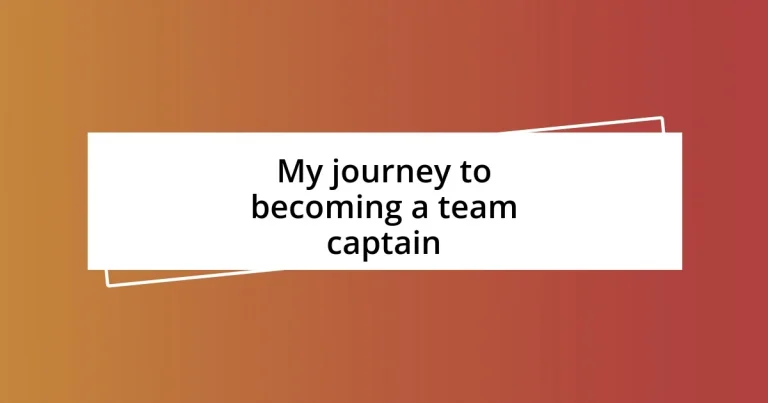Key takeaways:
- Overcoming early setbacks, like missing a penalty kick, instilled resilience and helped shape a determined mindset towards personal and team improvement.
- Building trust through empathy, open communication, and accountability was pivotal in fostering a supportive team environment where players felt valued and connected.
- Effective leadership as a captain involved listening to teammates, sharing vulnerabilities, and collaboratively setting goals, which enhanced team morale and unity.

My early experiences in sports
One of my earliest memories in sports involves my first little league baseball game. I can still feel the nerves bubbling in my stomach as I stood in the outfield, gripping my glove tightly, hoping I’d catch a fly ball. Have you ever felt that cocktail of excitement and dread when stepping onto the field for the first time? It’s both thrilling and terrifying, isn’t it?
As I stepped up to the plate in that game, I swung and missed at the first pitch, and a wave of embarrassment washed over me. However, I quickly learned that failure is part of the journey in sports. I remember my coach’s encouraging words, reminding me that even the best players strike out sometimes. That moment taught me resilience—something that would be crucial as I continued my journey in athletics.
In high school, I tried out for the soccer team, and the camaraderie I felt with my teammates stood out more than anything. We were a mix of skill levels, yet we supported each other relentlessly during those grueling practices. Those afternoons spent kicking the ball around not only honed my skills but also instilled a deep sense of belonging. How often do we find that, in sports, we forge connections that last a lifetime? The memories of those shared victories and defeats sparked a passion that would eventually guide my path to becoming a team captain.

Discovering leadership qualities
As I navigated through various teams, I began to notice traits that distinguished good players from great leaders. It wasn’t just about talent; it was about how they lifted others up, communicated effectively, and faced challenges head-on. I remember watching a teammate, who seemed quiet at first, motivate everyone during half-time with her passionate words. It opened my eyes to the idea that leadership often shines brightest in the moments we least expect.
Here are some key leadership qualities I recognized during my journey:
- Empathy: Understanding teammates’ emotions and offering support when they struggled.
- Communication: The ability to articulate thoughts clearly, creating an open environment for discussion.
- Accountability: Acknowledging mistakes and encouraging others to do the same, fostering a culture of growth.
- Confidence: Leading by example, inspiring others through self-assurance during tough matches.
- Vision: Having a clear sense of direction and motivating the team toward shared goals, making everyone feel they play a part.
Realizing these traits shaped my understanding of what it meant to be a leader. I found myself reflecting on how I could embody these qualities, not just in competitions but in daily interactions.
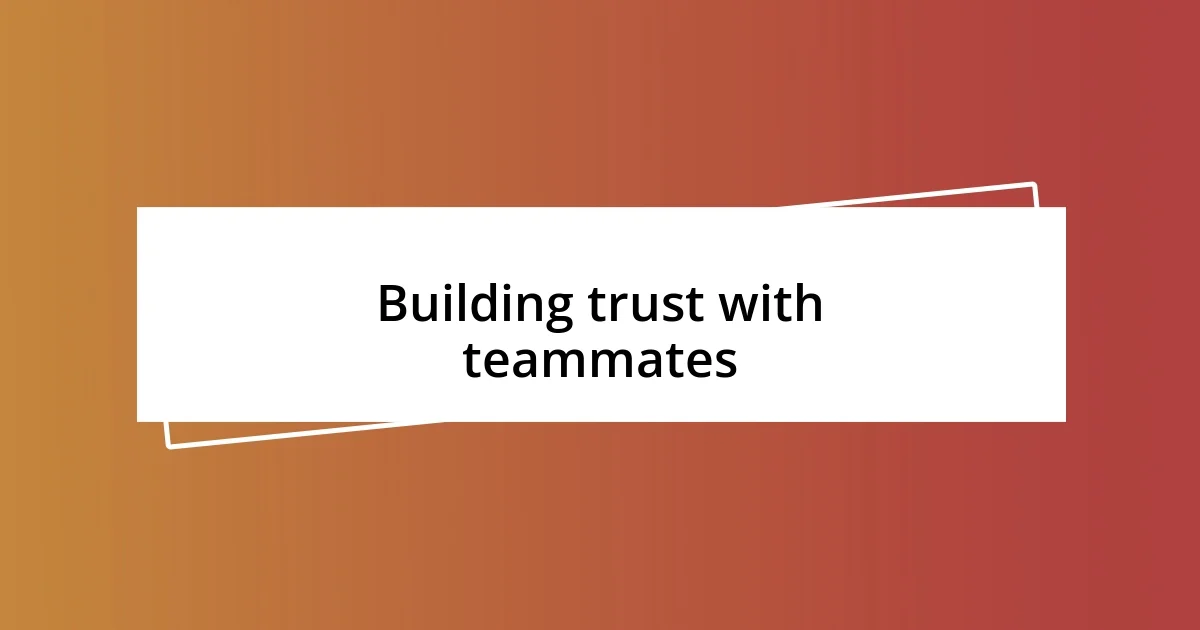
Building trust with teammates
Building trust with teammates is a cornerstone of effective leadership. I remember a moment during one particularly challenging practice when a teammate stumbled and fell. Instead of laughing or brushing it off, I rushed to help them up, and in that instant, I could feel the shift in our dynamic. It wasn’t just about sports; it was about being there for each other. Isn’t it funny how simple gestures can fortify bonds and create a safe space for vulnerability?
Trust also blossoms in the little things. Once, after a tough loss, I organized a casual meet-up where we could share our thoughts without judgement. It turned into a heartwarming night filled with laughter and heartfelt stories. We each opened up about our fears and aspirations, which, believe me, is challenging. But, when I saw the relief on my teammates’ faces, I realized just how much strengthening our relationships mattered. Those moments serve as reminders that trust isn’t built overnight; instead, it requires consistent effort and authenticity.
Then there’s the power of accountability in trust formation. I once had a teammate who was struggling with form, and rather than berating them, I took the time to listen and offer my support. By sharing my challenges too, I created an atmosphere where we could both learn and grow together. This shared responsibility trickled down to everyone in the team, promoting a culture of trust. Ultimately, trust evolves from knowing you can rely on each other, both on and off the field.
| Key Aspects of Building Trust | Examples from My Experience |
|---|---|
| Empathy | Helping a teammate after a fall created a supportive atmosphere. |
| Open Communication | Organizing a meet-up to share thoughts and feelings after a loss strengthened our bond. |
| Accountability | Listening and supporting a struggling teammate fostered mutual reliance. |

Developing communication skills
Communication skills are foundational in any leadership role, especially for a team captain. I recall one tense moment in practice when we struggled to execute a play. Instead of shouting orders from the sidelines, I gathered the team for a quick huddle. Encouraging open feedback, I listened to my teammates’ thoughts. It was amazing how those few minutes of discussion transformed confusion into clarity, allowing us to rally together and improve.
I’ve found that developing effective communication means actively practicing how I convey ideas and emotions. I remember a situation where, during a team meeting, I had to address an issue with our game strategy. My heart raced as I stood in front of my peers, but I reminded myself to focus on clarity over nerves. By framing my concerns with empathy and inviting input, we collaboratively crafted a new plan that everyone felt invested in. Have you ever found that small adjustments in your approach can result in monumental changes in reception?
Being aware of non-verbal cues has also dramatically enhanced my communication abilities. I learned this lesson during another pivotal moment when one of my teammates was unusually quiet and withdrawn during a workout. Instead of overlooking it, I approached them after practice. They opened up about personal challenges that affected their focus. Listening actively not only strengthened our bond but also helped me understand the unspoken language of our team. This experience confirmed for me that effective communication goes beyond words—it’s about truly connecting with others and fostering a supportive environment.
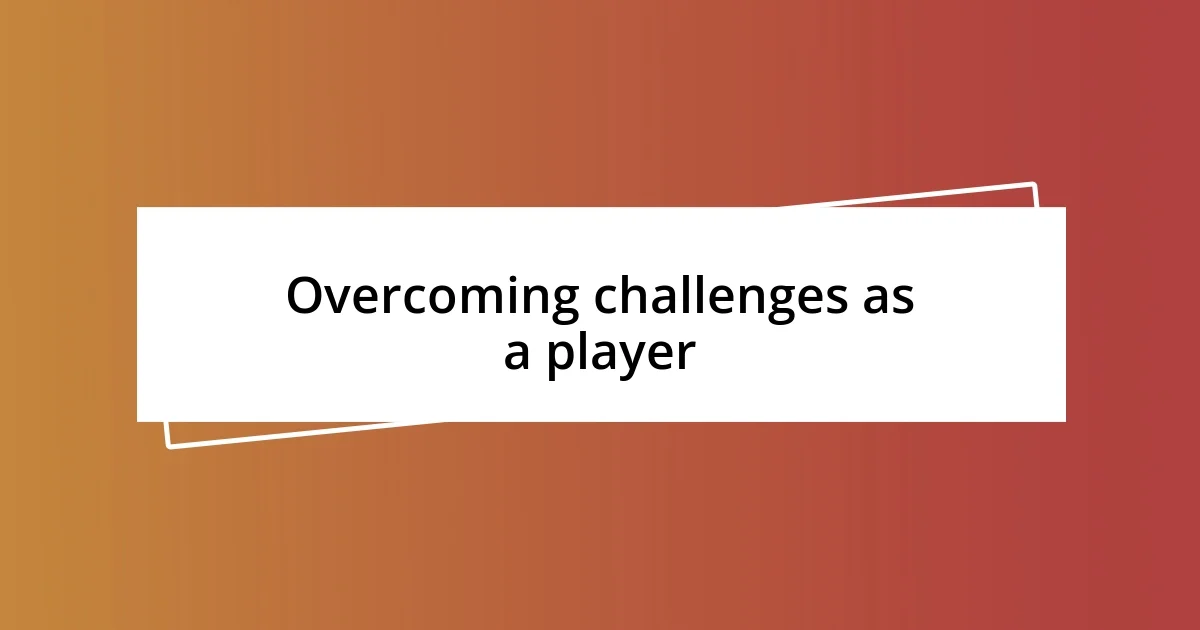
Overcoming challenges as a player
When I think back on my journey as a player, a recurrent theme is overcoming obstacles. One instance stands out: during a crucial match, I missed a penalty kick that could have won us the game. The immediate rush of disappointment was overwhelming; I felt like I had let my entire team down. But rather than letting that moment define me, I chose to reflect and learn. Have you ever faced a setback that made you question your abilities? For me, this was a turning point. I trained harder, focused on my technique, and the next time I stepped up to take a penalty, I approached it with renewed confidence.
Another challenge arose when I dealt with injury. Sitting on the sidelines was frustrating, yet it taught me resilience. While I couldn’t play, I immersed myself in understanding the strategies and dynamics of the game. I attended all the practices, cheering loudly and supporting my teammates. Surprisingly, this experience deepened my connection with them. Has adversity ever led you to discover strengths you didn’t know you had? I found that by shifting my focus from my limitations to my contributions, I was able to maintain that sense of belonging, even when I wasn’t on the field.
Then there was the period of developing my mental game. I often found myself battling anxiety before big games, which is something I’m sure many players can relate to. I remember a specific moment during finals week when I almost convinced myself to quit altogether. But, instead of succumbing to the pressure, I began journaling my thoughts and practicing visualization techniques. By envisioning not just the game, but my performance, I created a mental toolkit that helped ease my nerves. Have you ever tried to harness your mind in the heat of a challenge? It’s fascinating how addressing mental barriers can transform your approach to competition. Each setback has reinforced my resolve, ultimately shaping me into a more tenacious player.
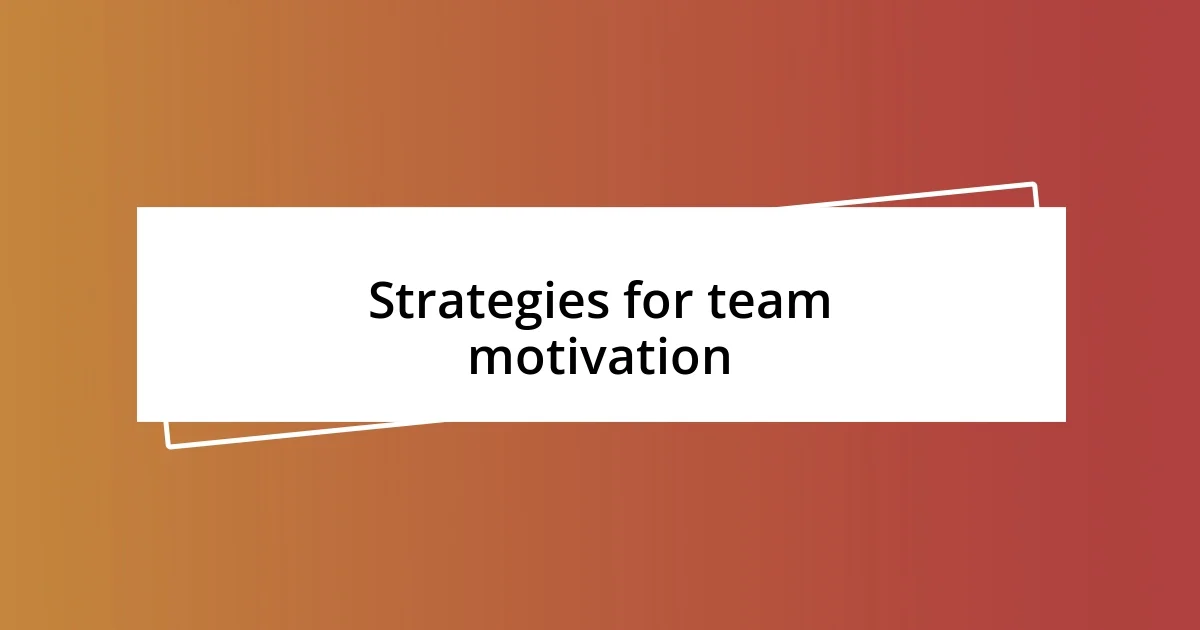
Strategies for team motivation
One strategy that has proven effective in motivating my team is setting shared goals. Early in my journey as a captain, I realized that when everyone is working toward the same objective, it fosters a sense of unity. I remember calling a team meeting where we collectively outlined our goals for the season. The excitement in the room was palpable as each player contributed their aspirations. Have you ever noticed how much more engaged a team can be when they feel personally invested in the mission? This experience taught me that when we all had a stake in our success, it brought energy and enthusiasm that propelled us forward.
Celebrating small victories has another significant impact on team morale. I used to underestimate how much recognition matters until one day during practice, I surprised everyone by acknowledging individual improvements—like a player mastering a tricky skill. The smiles and energy that erupted from that simple acknowledgment were unforgettable. It made me realize that motivation doesn’t always come from big wins but can stem from the progress made along the way. Isn’t it refreshing to see effort pay off, even in minor ways? By fostering an environment of appreciation, not only did we motivate each other, but we also built a stronger bond.
Lastly, creating a positive culture around feedback has been essential. I remember a time when I encouraged honest discussions after games, win or lose. One night, after a tough match where we fell short, I initiated a session to openly share thoughts and learn from the experience. It was remarkable how everyone felt safe enough to voice their feelings. This openness didn’t just alleviate frustration; it ignited a collective drive to improve and support one another. What if we all took a moment to reflect on how our team dynamic can change with just a little vulnerability? I firmly believe that fostering an atmosphere where constructive feedback is welcomed is a powerful motivator for any team.
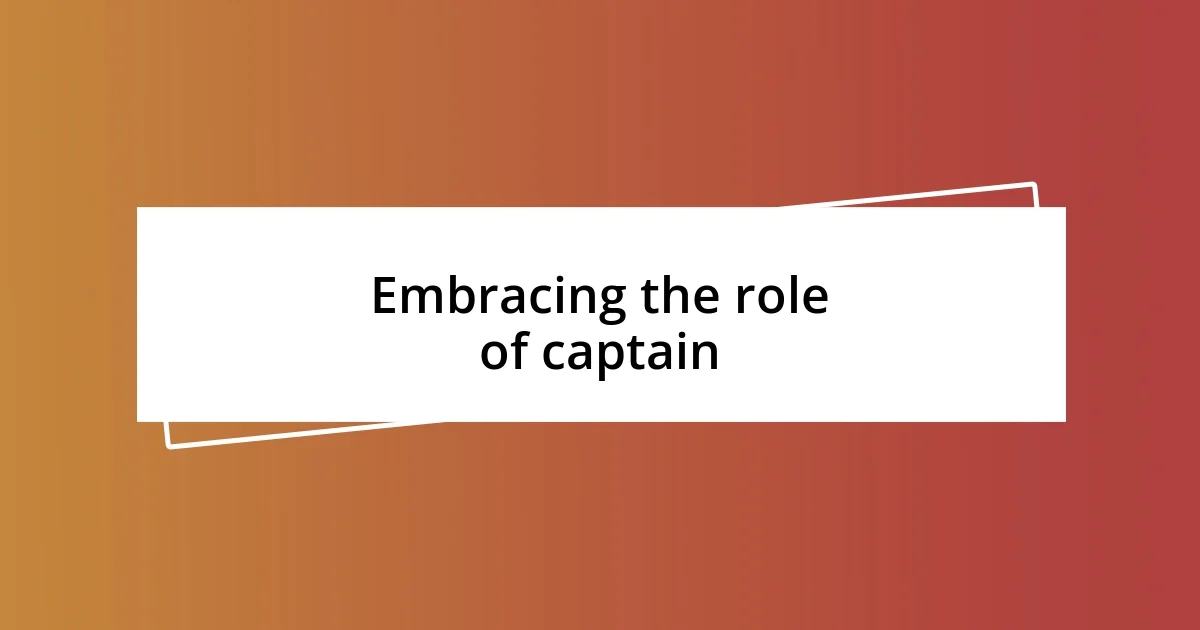
Embracing the role of captain
Embracing the role of captain was not just stepping up to lead; it required me to redefine my understanding of leadership. I recall the first match I captained, feeling a mix of excitement and intense pressure. The moment my teammates looked to me for guidance, I realized that my decisions and mindset would set the tone for the entire game. Have you ever felt the weight of responsibility transform your confidence? It did for me, pushing me to be more mindful of my actions and words, knowing that they could inspire or deflate the team’s spirit.
As I settled into this role, I discovered that being a captain meant listening as much as it meant leading. During team huddles, I made it a point to invite everyone to share their thoughts. I remember one instance where a quieter teammate had a brilliant idea about our defensive strategy. When I guided the discussion towards him, the appreciation in his eyes was unforgettable. Isn’t it rewarding to see someone bloom when given the right support? This experience taught me that leadership is not just about calling the shots; it’s about amplifying the voices within the team.
Another critical aspect of embracing my captaincy was fostering resilience through open vulnerability. I shared my struggles with performance anxiety during a team talk, and to my surprise, many of my teammates opened up about their own fears. This shared vulnerability forged a deeper connection among us, making the pressure of competition feel less isolating. Have you ever bonded with someone through shared challenges? By creating a safe space to talk openly, I found that our collective determination to rise above setbacks grew stronger, uniting us as a team.












